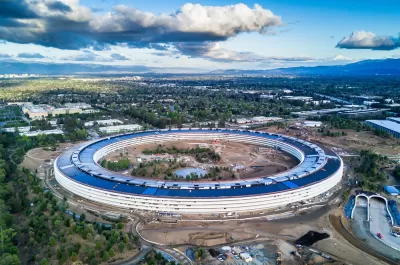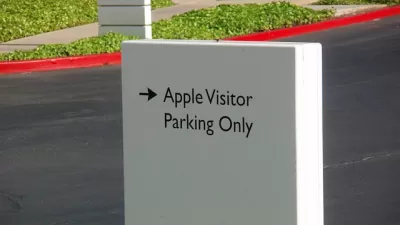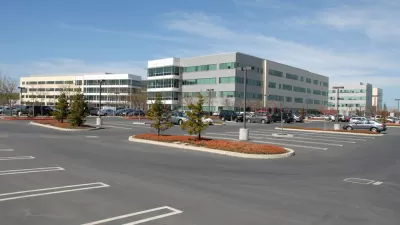Apple's new campus contains thousands of parking spaces, but neither transit options nor daycare.

Apple anticipates only about 10 percent of the employees that will work in its new headquarters will live in Cupertino, the city where Apple's headquarters was built. This is an old fashioned approach to building an office campus. "By moving out of downtown skyscrapers and building in the suburbs, corporations were reflecting 1950s ideas about cities—they were dirty, crowded, and unpleasantly diverse," Adam Rogers argues in Wired.
The location and purpose-built nature of the building make it unsuited to evolve. "If Apple ever goes out of business, what would happen to the building? The same thing that happened to Union Carbide’s. That’s why nobody builds these things anymore," writes Rogers. To ease the concerns of the city's mayor, Apple will contribute hundreds of thousand of dollars to Cupertino and neighboring cities in parking restitution, but urbanists had hoped they would have invested in other transit. "The company could have chipped in to double the frequency of CalTrain’s commuter rail. It could have built a transit center in Cupertino, which, unlike Mountain View and Palo Alto, has none."
FULL STORY: IF YOU CARE ABOUT CITIES, APPLE'S NEW CAMPUS SUCKS

Alabama: Trump Terminates Settlements for Black Communities Harmed By Raw Sewage
Trump deemed the landmark civil rights agreement “illegal DEI and environmental justice policy.”

Study: Maui’s Plan to Convert Vacation Rentals to Long-Term Housing Could Cause Nearly $1 Billion Economic Loss
The plan would reduce visitor accommodation by 25% resulting in 1,900 jobs lost.

Planetizen Federal Action Tracker
A weekly monitor of how Trump’s orders and actions are impacting planners and planning in America.

Wind Energy on the Rise Despite Federal Policy Reversal
The Trump administration is revoking federal support for renewable energy, but demand for new projects continues unabated.

Passengers Flock to Caltrain After Electrification
The new electric trains are running faster and more reliably, leading to strong ridership growth on the Bay Area rail system.

Texas Churches Rally Behind ‘Yes in God’s Back Yard’ Legislation
Religious leaders want the state to reduce zoning regulations to streamline leasing church-owned land to housing developers.
Urban Design for Planners 1: Software Tools
This six-course series explores essential urban design concepts using open source software and equips planners with the tools they need to participate fully in the urban design process.
Planning for Universal Design
Learn the tools for implementing Universal Design in planning regulations.
Caltrans
Smith Gee Studio
Institute for Housing and Urban Development Studies (IHS)
City of Grandview
Harvard GSD Executive Education
Toledo-Lucas County Plan Commissions
Salt Lake City
NYU Wagner Graduate School of Public Service





























